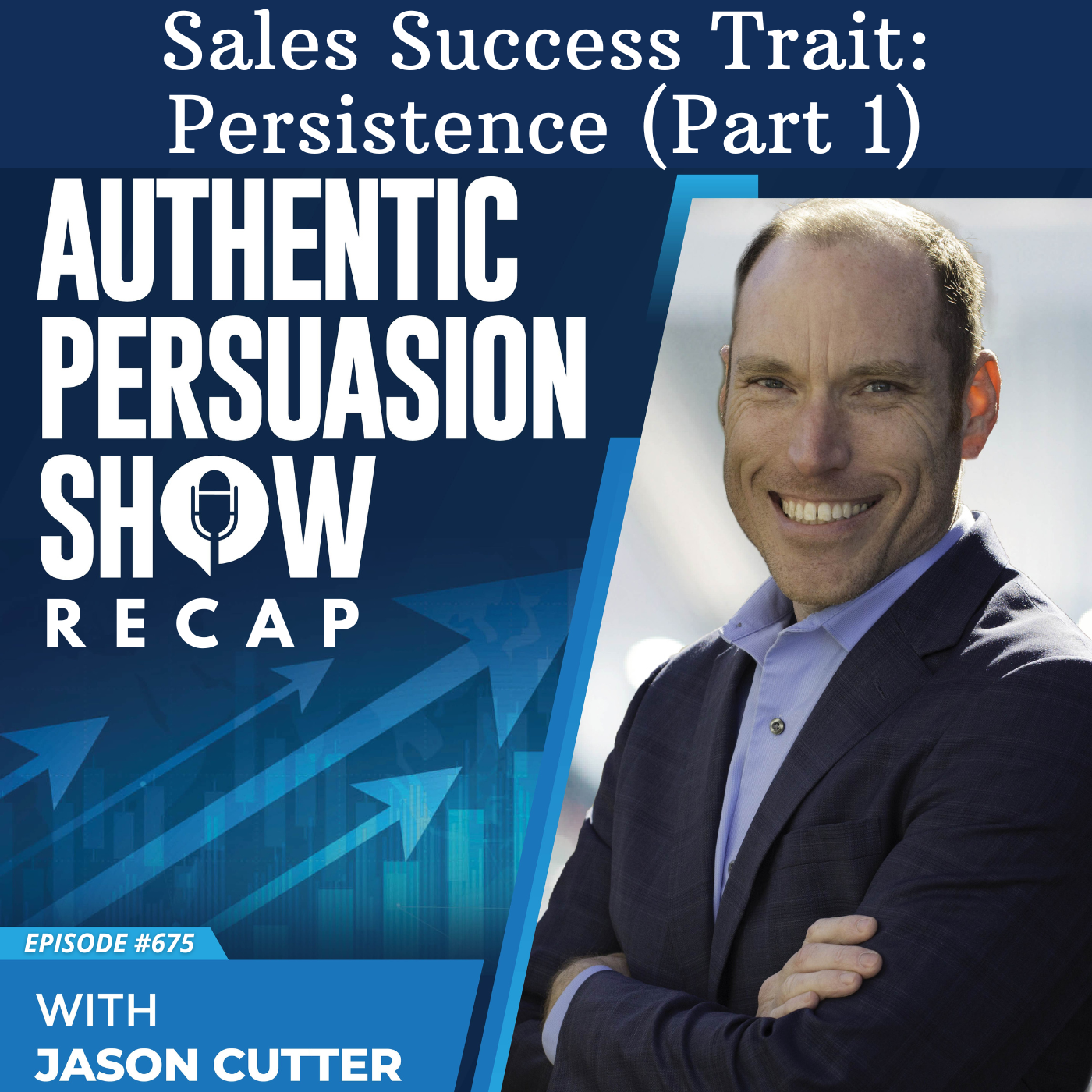Episode Transcript
[00:00:00] Speaker A: Welcome to the authentic persuasion show. On this episode, I want to replay part of a previous show. Maybe you heard the original full length episode and this could be a great refresher and reminder. Or maybe this is your first time hearing this content and the timing could be just right to help you leverage authentic persuasion today in your role, no matter what. Here's to your success.
This is the authentic persuasion show.
[00:00:24] Speaker B: You, you've got to know. Now, here is one of the things, and I haven't gotten to the empathy reason yet, so stay tuned for that. I will get to that. It's not that I'm avoiding it, it's that we're building up to this. Here's the biggest thing, and here's one of the challenges that comes up, is people don't want to spend a lot of time in the question asking phase.
A lot of people in sales think that their role, their job as a salesperson is to pitch. Their job is to explain. Their job is to give a demo. Their job is to essentially give facts and figures, features, benefits, reading from the brochure, they think that's their job.
[00:01:09] Speaker C: Right?
[00:01:10] Speaker B: Like looking at that trade show example. And many people have gone to trade shows, whether it's been a professional industry thing or even as an individual. I mean, when I was a kid, we used to go to rv shows and home and garden shows. And it's the same thing. People think. People in sales think their job is just to pitch and explain.
[00:01:32] Speaker C: And again, the hope is if I.
[00:01:35] Speaker B: Just tell enough people what I do.
[00:01:38] Speaker C: What our company provides, and I push.
[00:01:40] Speaker B: People forward or I do my best.
[00:01:43] Speaker C: And give some effort, then that's sales. Right?
[00:01:47] Speaker B: And then I will win. A lot of people in sales, kind of like some people I've seen in my life in the past, view it with dating is, it's a numbers game, right? Like if I talk to 100 people in sales and I just pitch my product, I will close some deals. But you're hoping for that person where there's an alignment, they're okay with that. They don't necessarily need many of these other things that we're talking about in the authentic persuasion pathway. And then you're just hoping for those numbers. Now, can you be successful at that? I think so. Short term, I've seen people do it. It's a hard way to go. If you've got to talk to 100 people and pitch 100 people and to close one or two or three, that's difficult, that's draining. And when we talk about mental health and physical health and wellness, that is a tough game to play. That is a tough one. To get up to bat 100 times and only hit two or three times.
[00:02:43] Speaker C: Four times, that's a tough one.
[00:02:46] Speaker B: You can't sustain that, right? Everyone has their slumps, but that's a tough one to sustain. But you see that, too. I know some guys that are like, well, if I just ask out enough people, then someone's going to say yes, yes, and maybe that pure numbers game is going to work, but that's not the most effective thing, right? Because again, we're talking about sales, but it's relationships. Everything is relationships. Everything is sales. Everything is dealing with somebody else.
So that volume doesn't work when people just get into that mode. And people in sales, unfortunately, think that's what sales is.
[00:03:22] Speaker C: Sales is just pitching.
[00:03:25] Speaker B: Sales is vomiting all my information on.
[00:03:28] Speaker C: Somebody else and hoping something works and sticks and then they want to move forward. Or I'll use some tactics and some.
[00:03:36] Speaker B: Tricks and some slick lines that I.
[00:03:39] Speaker C: Heard, and then I will convince, motivate, manipulate, bribe, whatever it is, right?
[00:03:49] Speaker B: Hey, if you sign up by Friday before the end of the quarter, then we'll give you this discount, right? That's manipulation. You're manipulating them to make a decision.
[00:03:57] Speaker C: Now based on some exchange.
[00:04:00] Speaker B: Right? Now, companies and salespeople don't like to hear that, but it's the truth. Not saying not to do that, but that's what they do.
Fundamentally, we don't want to do that. And here's the thing that comes up, and this is what I get from a lot of people in sales, or when I see it, is people are afraid of spending time in the question asking phase, because they think the goal of sales is to sell, right? Is to tell, is to just explain and dominate the conversation. That's why, starting last week, and I brought it up, again, two ears, one mouth, most people in sales, and we've all experienced that as a customer, again, five mouths, no ear. They're just like, how do I just steamroll over you and talk all the time and just convince you to buy? But that doesn't work, not in this era, not in this day and age, not with what buyers want anymore. So what you want to do is you want to spend as much time in the question asking phase as possible.
[00:05:02] Speaker C: This is tough because it goes against.
[00:05:04] Speaker B: What a lot of people think they should be doing in sales, goes against what a lot of people think that they should be spending their time on in these conversations. And the best analogy and example I can give that a lot of people are familiar with is from another profession. And it's so important to look at what another profession, what actual professions do, and this is why I brought up early on, is that sales is not a profession. There's people who treat it like a profession, and they put themselves in a situation where they hold themselves to an oath, a code of ethics, a higher level of standards. They show up every day. They act like a professional. They do what professionals do. They have a duty and obligation to others. But that's all in it's not regulated, it's not external.
![[716] Effective Questioning in Sales](https://episodes.castos.com/salesexperiencepodcast/images/1640937/c1a-4d8w-7n5rn4p6u35d-ntzpfi.png)


